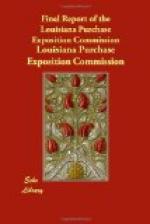material themselves. Mr. Krug studied awhile and
said that he would be willing to do the work for President
Francis, but it would take him some time to figure
on the proposition so as to submit an intelligent
figure. President Francis said that if they decided
to wreck the buildings themselves on a contract that
he would let him know when his bid would be wanted.
At this time President Francis requested Mr. Krug
to submit in writing his bid for $76,600 and have it
in by 10 o’clock the next morning. We then
left the room, and they requested us to remain in
the anteroom. We were there until about 6 o’clock.
During that time they called in other bidders.
About 6 o’clock Mr. Taylor’s secretary
came into the room and announced that the salvage committee
had adjourned until the next day at 2 p. m. We
then left the grounds and went to the Lindell Hotel.
When we reached the hotel that night we made up a
revised bid. The next day we went to Mr. Taylor’s
office about 10 a. m. and gave to Mr. Taylor’s
clerk the bid in writing for $76,600, and he said
he would bring it to the attention of the committee
when they met. We waited there from 10 a. m.
until 2 p. m. In the meantime Mr. Krug sent in
his card to Mr. Taylor’s office and asked if
any action would be taken on the bids that afternoon.
We were informed that nothing would be done with the
bids that day, and that the salvage committee had
adjourned until the following Monday. I left St.
Louis that night for Chicago. I returned to St.
Louis on Monday, November 14, 1904, arriving there
at 10 a. m. Mr. Krug remained in St. Louis all
the time. When I returned to St. Louis Mr. Krug
and I went to Mr. Taylor’s office. We reached
there about 10 a. m., Monday, November 14. We
waited there until about 2.30 or 3 p. m. While
we were waiting in the anteroom Mr. Taylor’s
private secretary came in and told us that all bids
had been rejected. We then left the grounds,
and Mr. Krug and I returned to Chicago that night.
I never saw by the papers or otherwise where new bids
were requested after the announcement that the first
bids had been rejected. I watched the papers
very closely, as we were desirous of submitting a new
bid when called for.
From what I saw while I was in the anteroom and in
the committee room I am fully convinced that the Chicago
House Wrecking Company was given inside information
as to what property was to be sold, and I consider
that they were given privileges and favored from the
beginning of the deal, in view of the fact that a
majority of the bidders desired their bids opened
in public, while the Harris brothers protested against
such procedure, and they were sustained in their protest
by the salvage committee.
I have had considerable experience in handling bids
and being present when bids are opened, and I never
before saw such proceedings as took place in the meeting
room of the salvage committee on November 10, 1904.




